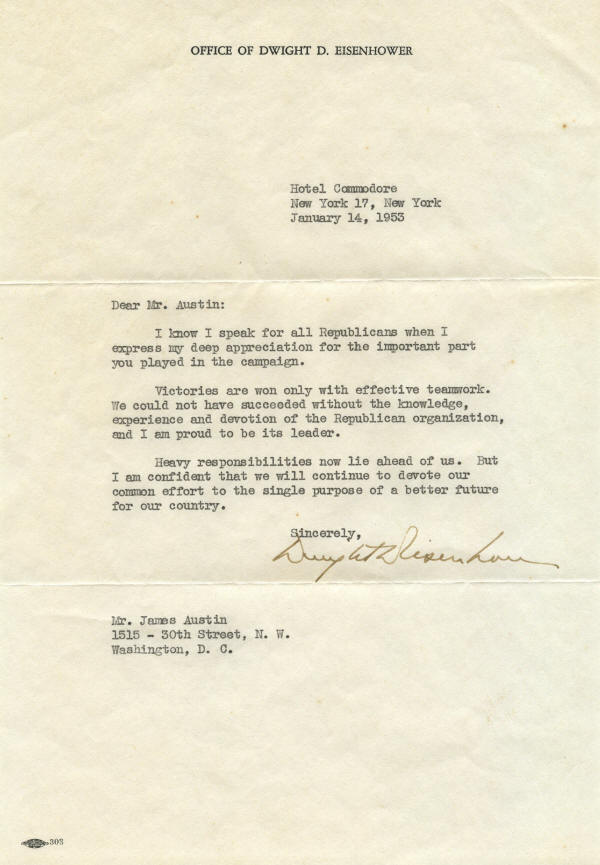040078
Dwight D. Eisenhower
Scroll down to see scans of the item below the description
Dwight David Eisenhower, 1890-1969. General of the Army; Supreme Commander, Allied Expeditionary Force, World War II; 34th President of the United States, 1953-1961. Excellent content Typed Letter Signed as President-Elect, Dwight D. Eisenhower, one page, 7" x 10¼", Hotel Commodore, New York City, on stationery of the Office of Dwight D. Eisenhower.
Six days before he was to take office as President, Eisenhower writes to thank a supporter for his efforts in the campaign. In full: “I know I speak for all Republicans when I express my deep appreciation for the important part you played in the campaign. / Victories are won only with effective teamwork. We could not have succeeded without the knowledge, experience and devotion of the Republican organization, and I am proud to be its leader. / Heavy responsibilities now lie ahead of us. But I am confident that we will continue to devote our common effort to the single purpose of a better future for our country."
During his military career, Eisenhower eschewed politics and never disclosed his party preference. In 1948, President Harry S. Truman offered to run as vice president if Eisenhower would accept the Democratic presidential nomination, but Eisenhower declined. Four years later, Eisenhower accepted the call of internationalist Republicans to oppose isolationist Ohio Senator Robert Taft for the Republican nomination. As the NATO supreme commander following World War II, Eisenhower fully understood the role that the United States had to play in world affairs. He announced that he was a Kansas Republican and agreed to seek the nomination. In this letter he expresses his pride at leading the Republican party.
Eisenhower was born in Denison, Texas, but was raised in Abilene, Kansas, the third of seven sons. An outstanding athlete, he received an appointment to West Point in 1911. He met Mamie Geneva Doud, whom he married in 1916, while he was stationed in Texas as a second lieutenant.
In his early Army career, Eisenhower excelled in staff assignments, serving under Generals John J. Pershing, Douglas MacArthur, and Walter Krueger. After the Japanese attack on Pearl Harbor, General George C. Marshall called Eisenhower to Washington for a war plans assignment. Eisenhower commanded the Allied forces landing in North Africa in November 1942. The day before Christmas 1943, he was appointed Supreme Commander of the Allied Expeditionary Force in Europe, and he commanded the troops invading France on D-Day, June 6, 1944. On December 20, 1944, he was promoted to General of the Army.
After the war, Eisenhower was appointed Army Chief of Staff. During his tenure, he became the first Army Chief of Staff under the unification of armed services within the newly created Department of Defense.
Eisenhower retired from the Army in to become President of Columbia University, then took leave to assume supreme command over the new NATO forces being assembled in 1951. Republican emissaries to his headquarters near Paris persuaded him to run for President in 1952. ”I like Ike” was an irresistible slogan, and Eisenhower won a sweeping victory.
He brought to the Presidency his prestige as commanding general of the victorious forces in Europe during World War II. He obtained a truce in Korea and worked incessantly during his two terms to ease the tensions of the Cold War. He pursued the moderate policies of ”Modern Republicanism,” pointing out as he left office, ”America is today the strongest, most influential, and most productive nation in the world.”
Before he left office in January 1961, for his farm in Gettysburg, he urged the necessity of maintaining an adequate military strength but cautioned that vast, long-continued military expenditures could breed potential dangers to our way of life. He concluded with a prayer for peace ”in the goodness of time.” Both themes remained timely and urgent when he died, after a long illness, on March 28, 1969.
It is hard to find good content Eisenhower letters from the period just before and during his presidency. This one has excellent political content. It is one of the better Eisenhower letters that we have seen from this period.
The letter is virtually pristine. It has normal mailing folds and a few tiny foxing spots that are barely noticeable. Eisenhower’s signature has faded somewhat from prior framing but is still bold.
Unframed. Please ask us about custom framing this piece.
This item has been sold.
Click here to see more Eisenhower items on the Presidents page.

